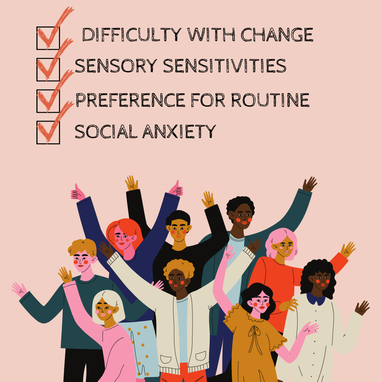|
In recent years, we’ve seen an increase in autism diagnoses throughout the Western world, with more and more individuals seeking an autism diagnosis in adulthood. Likewise, there is an increasing number of people who choose to self-identify as Autistic without ever seeking a formal diagnosis. While many meet the idea of self-diagnosis with scepticism, it is important that we endeavour to understand why people might choose to self-diagnose and forgo an official autism assessment. While there are, undoubtably, a plethora of reasons why someone might choose to self-diagnose, I will outline four common explanations below.
1. OUTDATED CONCEPTUALISATIONS OF AUTISM: The current diagnostic criteria is based on male presentations of autism and may therefore fail to accurately capture the experiences of Autistic female and non-binary individuals, resulting in missed diagnoses or misdiagnosis among these groups. Moreover, many Autistic people are first diagnosed with anxiety and depression (both common concerns for many Autistic people) while their Autistic traits may be overshadowed by genuine mental health concerns. Some Autistic people also report first receiving a diagnosis of borderline personality “disorder” (a condition also impacting social interaction and behaviour) before later receiving an autism diagnosis. For this reason, many individuals, who are in fact Autistic, risk being denied a diagnosis simply because the practitioner conducting the assessment (or the practitioner responsible for referring for an assessment) holds outdated views of autism based solely upon male-centric experiences. 2. MASKING OR CAMOUFLAGING BEHAVIOURS: Some Autistic individuals (such as those socialised as girls) may utilise masking or camouflaging behaviours (an attempt to disguise Autistic traits) to better assimilate or "fit in". This may make it harder for medical professionals to recognise Autistic traits in this population, ultimately resulting in many individuals "slipping through the cracks" and being denied a medical diagnosis. Many individuals may therefore choose to self-diagnose as a way of explaining their experiences. 3. INVALIDATION BY MEDICAL PROFESSIONALS: Medical professionals commonly dismiss and invalidate undiagnosed Autistic adults, particularly women, who might not present in a stereotypical way. Many Autistic individuals also suffer chronic pain and fatigue associated with various physical conditions (fibromyalgia, Ehlers-Danlos Syndrome/Hypermobility Spectrum Disorder, and Chronic Fatigue Syndrome/M.E. - to name a few) and often report experiences of invalidation from medical professionals. This is in part due to a lack of research into these conditions meaning many practitioners have a poor understanding of these illnesses. This makes many individuals reluctant to obtain a medical diagnosis and may result in some preferring to self-diagnose rather than go for an autism assessment and risk further invalidation. 4. NHS WAIT TIMES AND ASSESSMENT COSTS: Finally, the waiting time for an autism assessment in many parts of the UK is over two years and many individuals cannot afford a private assessment. Some people may therefore choose to self-diagnose in the interim, as self-diagnosis may improve one’s understanding of themselves and encourage connection with others with similar experiences. THE TAKEAWAY: Many individuals may self-diagnose rather than seeking a formal autism diagnosis. This is due to many factors, including the current failure of the medical system in recognising Autistic traits in females or those who do not present in a stereotypically Autistic way, current assessment wait times in the UK, and the high cost of private autism assessments. It is important that we don’t risk further invalidating Autistic individuals by dismissing one’s experiences and suspicions. As a therapist, I feel it is vital that I remain open to exploring neurodivergence in the counselling room, particularly as we are beginning to recognise the limitations of the current diagnostic criteria in identifying autism in women and non-binary persons. Therapy should be a safe place to explore these ideas and the way they resonate with one’s experiences. If you suspect you might be Autistic, here are some useful links: BOOKS: INSTAGRAM: PODCASTS: |
About the
|


